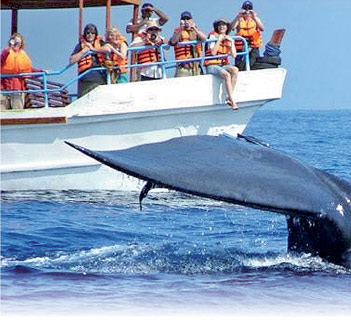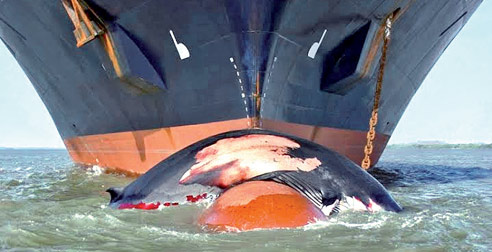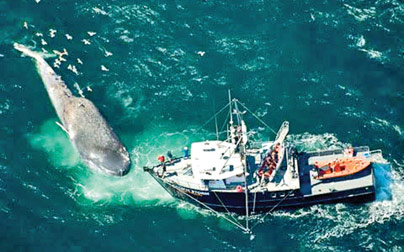Whale of a tale
Evidence to the contrary, opinion is divided on
threats posed by ships to the massive marine mammals:
by Dhaneshi Yatawara
|

Whale watching |
Whales, the aquatic placental marine mammals said to be the closest
living relatives of the land-based hippopotamuses, having diverged about
40 million years ago, stole the limelight last week, as the first two
days of the first ever International Experts and Stakeholders Conference
on Marine Mammals, with special Reference to the Issue of Ship-Strikes
and the International Maritime Organisation Traffic Separation Scheme (TSS)
at Dondra Head, saw stakeholders fighting over shipping lanes and whale
welfare.
A 15-year old idea, moving the existing shipping lines 15 nautical
miles southward, was aired out and discussed in detail, as all
stakeholders - government authorities, international organisations,
researchers, conservationists and shipping companies and their agents -
came together at one table for the first time to think of ways to save
Sri Lanka's magnificent whales.
Sri Lanka is globally renowned for its blue whales and for the small
population of Pygmy whales observed mostly down Dondra point.
The Conference co-ordinated and organised by the Indian Ocean Marine
Affairs Cooperation (IOMAC) was held in BMICH, with the third day
dedicated to the expert panel to reach a conclusion.
Discussions on the first day were focused on the plight of the
hapless whales, while the second day teetered towards real world
discussions, garnished with opinions and counter opinions. The main
argument debated and defended was the lack of credible evidence to
establish that whale deaths are due to ship strikes.
Foreign scientists at the conference from organisations such as the
University of St. Andrews in Scotland, the International Whaling
Commission (IWC), the International Fund for Animal Welfare, and the
Biosphere Foundation supported a science-based conclusion that a
shifting in sea traffic will bring about a drastic reduction in whale
ship strikes.
Yet there were number of counter points, with the shipping companies
and local and international authorities demanding credible evidence to
prove whale deaths due to ship-strikes and researchers and international
and local conservationists putting forward the view that there was
enough and more evidence to prove the point.
Whale citing
Evidence and data need to be collected across the year, said Howard
Martenstyn, Director Research of the Centre for Research on Indian Ocean
Marine Mammals (CRIOMM). "Whale citing are recorded only during the
whale watching season but to take a decisive turn, we need more data
with scientific base," he added.
|

Ship strike whale |
He was of the view that many research findings were compartmentalised
and called for policy makers to network and use these data to reach
decisions for the safety of the animals.
However, Dr. Russel Leaper, Chairman IWC Scientific Sub Committee on
Ship Strikes, said there was enough evidence to prove whale deaths do
happen due to ship strikes. "Compared to annual average whale deaths
happening along the seas off California in the USA, Sri Lanka data are
high and that fact needs more attention," he said.
Founder of the Sri Lanka Blue Whale Project, Dr. Asha de Vos, was of
the view that there exist a few questions that need answers before
moving forward. "I identified ship-strike as a potential problem for
whales in our waters back in 2003," she added.
According to Dr. de Vos, there was a requirement to know why the
whales were in areas that overlapped with ships. "Over the years, we
started answering these questions and filling in many of the gaps while
also getting unequivocal evidence that these whales were under threat
because of this problem. In 2012 we reported two incidents that occurred
over a 12-day period, to the International Whaling Commission (IWC) who
then designated the population of blue whales in our waters as one in
urgent need of conservation action," she elaborated.
She also referred to findings of scientists in California who have
dealt with the same issue and found that for each whale found struck and
killed at least 10 others have gone undocumented, because their
carcasses have sunk or been pushed offshore. "We have proof and it is
our responsibility to take necessary action to stop these whales from
getting killed. We should look to save them, not because of their
charisma and beauty, but because they have a very specific role in the
functioning of the ecosystem and if we removed them, it has knock on
effects on our health and well-being," she said.
According to Dr. de Vos' research, the whales are in these near-shore
areas because these areas are productive and have food. "Imagine if
there was a bus driving through your kitchen, how would you feel? You
would have to go there to get food despite the danger of getting hit?"
she said.
Real shame
Commenting on the arguments over pushing the shipping lanes 15
nautical miles southward off Dondra Point, Dr. de Vos said it will not
really affect the shipping industry but will have huge gains for a
species that is very valuable to Sri Lanka's economy. According to her
if Sri Lanka takes the decision, it will not be an extraordinary issue,
since ship lanes have been shifted to stop whales from getting killed.
The United States, Canada and Panama had previously submitted ship
re-routing requests in order to protect marine mammals and these had
been adopted by the IMO.
"These whales are drawing tourists from around the world to our
shores and they contribute to our economy through tourism - it would be
a real shame if we cannot see the value in protecting them in return,"
she pointed.
Environmentalists believe if the cause of death had been verified by
scientists at IWC, then stakeholders, including IOMAC must explain the
grounds to not acknowledge that verification, or to deny the existence
of that verification.
|

Blue whales |
The shipping lanes cross a feeding ground, said Dr. Hiran Jayawardene,
Secretary General of the IOMAC, who was instrumental in the creation of
the international Traffic Separation Scheme at Dondra Head through the
IMO in 1980 to reduce the risk of oil tanker collision and avert marine
pollution on the south coast and tourist beaches.
According to Dr. Jayawardene, studies and research on whale deaths
and ship strikes will continue with the IOMAC and the CRIOMM, which are
operated under his guidance.
One session of the Conference was dedicated to assess the legal
aspect of the possibility of shifting the shipping lanes under the law
of the seas. The panel moderated by retired Justice P.A. Ratnayake
strongly suggested bringing credible evidence.
Conservationists believe that if we wait for proof of whale strikes,
the entire conservation process would get postponed long enough, so much
so that the whale population would decline further towards extinction.
"The IWC data on whale ship strikes gives more than ten cases on Sri
Lanka's TSS.
Yet, nobody acknowledges the data. It's like it's not there. It is
important for stakeholders to be open about why this data is dismissed,"
said Mihiri Weerasena, a young conservationist who participated at the
conference.
According to her, photographic evidence, even the famous photograph
of a blue whale bisected neatly in two was denied as evidence of a ship
strike since "no one saw it happen". Weerasena alleged, Tony Wu, the
scientist who captured the so-called "contentious" image, had to retract
saying the cut was caused by a ship. |

